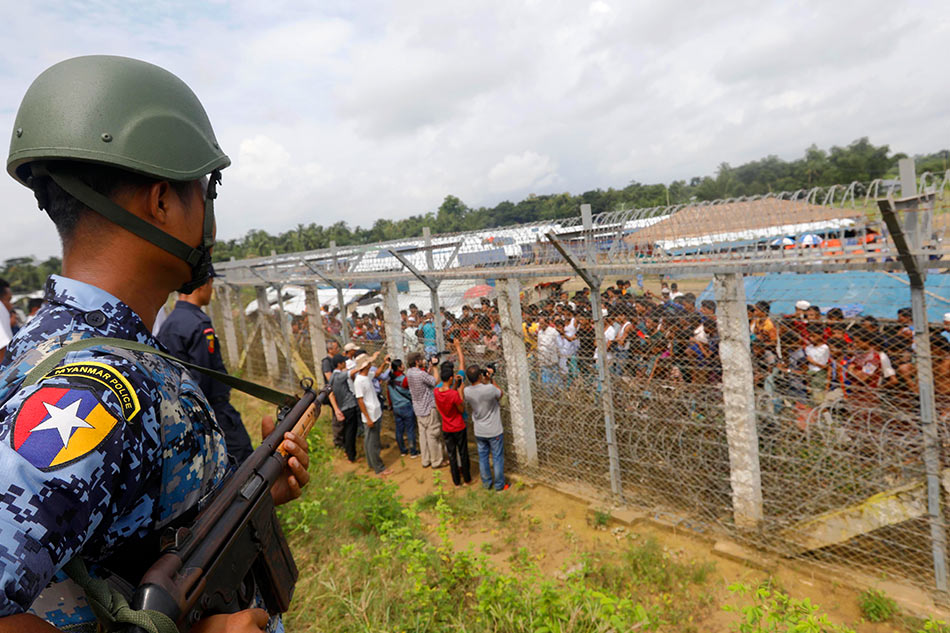Myanmar junta uses ID to carry out genocide vs Rohingya - group | ABS-CBN

Welcome, Kapamilya! We use cookies to improve your browsing experience. Continuing to use this site means you agree to our use of cookies. Tell me more!
Myanmar junta uses ID to carry out genocide vs Rohingya - group
Myanmar junta uses ID to carry out genocide vs Rohingya - group
ABS-CBN News
Published Jun 14, 2022 03:26 PM PHT
MANILA — Myanmar's military junta is employing identification documents to carry out genocide against the Rohingya people in Rakhine State, according to an international human rights organization.
MANILA — Myanmar's military junta is employing identification documents to carry out genocide against the Rohingya people in Rakhine State, according to an international human rights organization.
The tactic was also used during the Holocaust, in which the Nazi regime killed an estimated 6 million Jews in the 1940s, and in the Rwandan genocide of some 800,000 Tutsi people in 1994, Fortify Rights said.
The tactic was also used during the Holocaust, in which the Nazi regime killed an estimated 6 million Jews in the 1940s, and in the Rwandan genocide of some 800,000 Tutsi people in 1994, Fortify Rights said.
"In our view, those 3 case studies really show what we call the genocide by attrition," Dr. Ken MacLean, a senior advisor to Fortify Rights, told ANC's "Rundown".
"In our view, those 3 case studies really show what we call the genocide by attrition," Dr. Ken MacLean, a senior advisor to Fortify Rights, told ANC's "Rundown".
"The slow way in which identity documents, in particular, are used to identify, persecute marginalized and eventually in some cases, eliminate entirely certain segments of a population," he added.
"The slow way in which identity documents, in particular, are used to identify, persecute marginalized and eventually in some cases, eliminate entirely certain segments of a population," he added.
ADVERTISEMENT
In its 63-page report, Fortify Rights said Myanmar's military had coerced Rohingya people to obtain National Verification Cards—a document that confers no rights and identifies Rohingya as "foreigners" in the Southeast Asian nation.
In its 63-page report, Fortify Rights said Myanmar's military had coerced Rohingya people to obtain National Verification Cards—a document that confers no rights and identifies Rohingya as "foreigners" in the Southeast Asian nation.
Such policy led the junta to identify Rohingya as "Bengali" or another foreign identity, fueling allegations they are interlopers from Bangladesh, the group said.
Such policy led the junta to identify Rohingya as "Bengali" or another foreign identity, fueling allegations they are interlopers from Bangladesh, the group said.
Before the military-led and self-described “clearance operations” in 2016 and 2017, the estimated population of Rohingya in Myanmar was approximately 1 to 1.3 million, with the vast majority of Rohingya concentrated in 3 townships—Maungdaw, Buthidaung, and Rathedaung—in the northern part of Rakhine State adjacent to the Bangladesh border.
Before the military-led and self-described “clearance operations” in 2016 and 2017, the estimated population of Rohingya in Myanmar was approximately 1 to 1.3 million, with the vast majority of Rohingya concentrated in 3 townships—Maungdaw, Buthidaung, and Rathedaung—in the northern part of Rakhine State adjacent to the Bangladesh border.
"In recent years, the number of Rohingya in Myanmar have dropped precipitously due to the effectiveness of the Myanmar authorities’ genocidal campaign and policies of persecution against Rohingya," Fortify Rights said.
"In recent years, the number of Rohingya in Myanmar have dropped precipitously due to the effectiveness of the Myanmar authorities’ genocidal campaign and policies of persecution against Rohingya," Fortify Rights said.
"The estimated population of Rohingya in Myanmar, at the time of writing, is approximately 600,000."
"The estimated population of Rohingya in Myanmar, at the time of writing, is approximately 600,000."
ADVERTISEMENT
According to the group, the military-led atrocities forced more than 745,000 Rohingya, including more than 400,000 children, to flee Myanmar in 2017.
According to the group, the military-led atrocities forced more than 745,000 Rohingya, including more than 400,000 children, to flee Myanmar in 2017.
Rohingya survivors of the genocide who fled to neighboring Bangladesh largely remain living in sub-standard conditions in refugee camps.
Rohingya survivors of the genocide who fled to neighboring Bangladesh largely remain living in sub-standard conditions in refugee camps.
Fortify Rights urges the United Nations Security Council to refer Myanmar to the International Criminal Court or establish an ad hoc international criminal tribunal to investigate and prosecute genocide, crimes against humanity, and war crimes.
Fortify Rights urges the United Nations Security Council to refer Myanmar to the International Criminal Court or establish an ad hoc international criminal tribunal to investigate and prosecute genocide, crimes against humanity, and war crimes.
ADVERTISEMENT
ADVERTISEMENT


